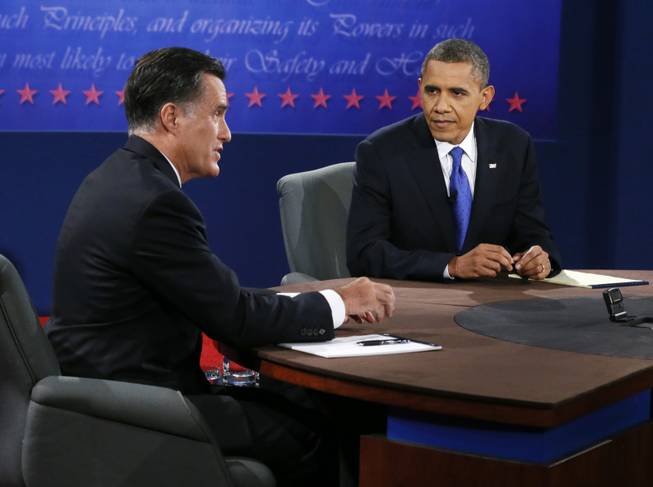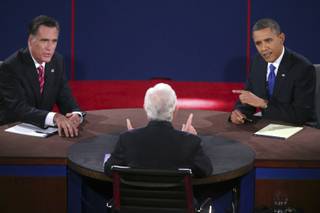
Pool-Rick Wilking / AP
President Barack Obama listens as Republican presidential nominee Mitt Romney speaks during the third presidential debate at Lynn University, Monday, Oct. 22, 2012, in Boca Raton, Fla.
Published Monday, Oct. 22, 2012 | 2 a.m.
Updated Monday, Oct. 22, 2012 | 4:59 p.m.
Sun coverage
After more than a year of full-throated campaigning, the presidential candidates meet tonight in the most storied of swing states for their last official face-to-face showdown before the election.
The Florida debate marks the last opportunity that President Barack Obama and his Republican challenger Mitt Romney will have to take direct swings at each other in a nationally-televised forum -- and will also be their final opportunity to make a convincing closing argument to the American public about why voters should support them.
But the topic of the debate -- foreign policy -- will not let either candidate finish on the strongest or most central note of his campaign.
Since the presidential debates started, the United States has sent troops to Jordan to help contain the Syrian crisis from spilling over the border, China has started naval exercises to project force in the Pacific and Iraq has concluded a major arms deal with Russia.
Any of these are serious developments that could compromise global security and U.S. policy in the affected regions.
But odds are slim that any of them will come up for discussion when the rivals debate foreign policy tonight in their third and final meeting before the election. The debate begins at 6 p.m.
“Foreign policy rarely leads in presidential elections. But except for Libya and Iran, it's been almost completely absent in this campaign,” said Eric Herzik, a professor of political science at UNR.
Despite that, Monday night is Obama and Romney’s last chance for each to make their direct, face-to-face case for why he should be trusted to be the leader of the free world.
“This is an election, and elections are about choices,” said Stephanie Cutter, an Obama campaign spokeswoman. “The president has a record of keeping the country strong and secure, and that will be on display tomorrow night.
“Governor Romney doesn’t have a foreign policy record, unless you count foreign investment,” Cutter went on, adding that whatever Romney has had to say on global affairs “has either been a blunder or it's been full of bluster.”
Romney’s advisers, not surprisingly, see their candidate as the consummate statesman and promise that in the debate he will “take on the idea” that Obama’s foreign policy is worth defending.
“The key thing about a president is that they have good judgment, and I think Governor Romney has that in spades,” said Eliot Cohen, one of Romney’s top foreign policy advisers. “What the American people will see, unfiltered, is all the qualities you will see in a commander in chief.”
Foreign policy is arguably the area in which the electorate can judge the candidates’ records and plans in their purest form. While Obama and Romney have argued over who would more ably bring down the unemployment rate or jump-start the jobs market, Congress is as much involved in making those decisions as the White House. But only the president can be commander in chief.
The past four years have brought a series of dramatic global changes demanding the president’s attention: The Arab Spring, the financial fall of Europe and the rise of China, the threats posed by Mexican drug cartels, and the wind-down of two wars in Iraq and Afghanistan are just a few of the events that have posed constant challenges to the United States’ top diplomatic and defense minds and will continue to test whomever is president over the next four years.
Romney and Obama have traded barbs about some of those issues, for example, on matters of trade that affect America's relationship with China and other countries.
“Governor Romney believes we need a fair and open international trading system,” Cohen said. “The Obama administration has ratified three free trade agreements, all of which were negotiated and completed in the previous administration. So basically, they’ve done nothing.”
“Romney's statements that the president has not enhanced America's trade is just flat-out wrong, and it's a lie,” Cutter said. “We’re in the process of negotiating a trans-Atlantic trade agreement which accounts for 40 percent of the world’s trade. On China, the president has brought twice the number of WTO enforcement cases against China in four years compared to the four years before that. He will do whatever it takes for American workers and business.”
They have argued about the proper way forward in Afghanistan, with Romney criticizing Obama for setting a 2014 pull-out date, and Obama defending his plans as being important if the objective “after more than a decade of war ... is to focus on rebuilding the nation at home,” as Cutter said.
But the two issues that have grown to dominate the foreign policy conversation are Iran’s march toward a nuclear weapon and the apparently planned assassination of the U.S. ambassador to Libya.
Romney criticized Obama in their previous debate for failing to immediately disclose that the assassination of four diplomatic security personnel in Benghazi, Libya, was due to a terrorist attack, charging that Obama tried to put the blame on angry-mob mentality spurred by a video because it was a more politically palatable excuse than admitting he had left the country vulnerable to terrorists.
Obama shot back that he was “offended” Romney would suggest he was playing politics with the deaths of four diplomatic personnel — right after accusing Romney of playing politics himself by attacking the president mere hours after the news of the deaths broke.
They also locked horns over Iran and whose approach to keeping the country from fully developing a nuclear weapon was more likely to keep the region nuke-free.
“Governor Romney believes very strongly that the threat to force has to be credible,” Cohen said.
“The president is not going to pursue cowboy, go-it-alone reckless foreign policy. He's going to keep this country safe,” Cutter said. “Wherever possible, bring the world with him. And he brought the world with him for tougher sanctions on Iran.”
Like the economy, much of the foreign policy situation both campaigns find themselves in has its roots in decisions that were made during the last decade. But both campaigns recoil from the mention of Bush’s name, or any association with his foreign policy.
The question of how they separate themselves from Bush is relevant to both campaigns, however. Romney has staked much of his foreign policy plans on the notion that the country has to continue to plan to keep the military strong so that it can pose a credible military threat in new theaters of conflict, such as Iran. Obama has, while presiding over the wind-down of two wars, advanced the Bush doctrine in other areas, especially when it comes to the proliferation of drones.
“On a drone question, ironically Obama can come out and be a hawkish Republican,” Herzik said. “And I can't wait to hear what Romney's going to say.”
Though these have been the main issues, there are many others that the candidates could weave into a discussion on foreign policy discussion.
“They have to fill an hour and a half. So they’ll pivot in terms of energy policy and national security,” said David Damore, political scientist at UNLV. “There are ways that they can bring in domestic issues, like immigration.”
The final comparison between the candidates may come down to a differences of philosophy and experience.
Experience is one thing the Obama campaign counts as having more of than Romney.
“He ended the war in Iraq. He imposed the toughest sanctions in history on Iran. He brought Osama bin Laden to justice,” Cutter said, ticking off her list of Obama’s achievements. “(Romney) hasn't been able to lay out anything different he would do than what Obama has done.”
“We will stand with the people who share our values,” Cohen said, bristling at the suggestion that Romney hasn’t been specific enough in setting himself apart from Obama’s policies.
“What exactly we would do in terms of deployment, exercises, specific measures? You can't say in advance precisely what that would be unless you're looking closely at intelligence. You can't have experience running foreign policy if you haven’t been the president,” Cohen continued pointing out that Obama had been completely inexperienced in foreign policy as well when he became president. “But (Romney) is an executive who’s used to making some very risky decisions.”
Still at this late stage of the campaign, and with voting already underway, what matters to the voters will more likely be lasting impressions, not lingering specifics.
“(Foreign policy) is not a lot on voters’ minds. It doesn’t come up in any of the top issues here,” said David Damore. “That is generally going to work to the advantage of the incumbent, because they’ll run the ‘this is what I’ve done on foreign policy, nothing horrible happened on my watch’ line.”
“It's the last debate, it's about issues that are out of the public's immediate list of priorities,” Herzik said. “The big thing (the candidates) have to do is not make a faux pas.”


Join the Discussion:
Check this out for a full explanation of our conversion to the LiveFyre commenting system and instructions on how to sign up for an account.
Full comments policy